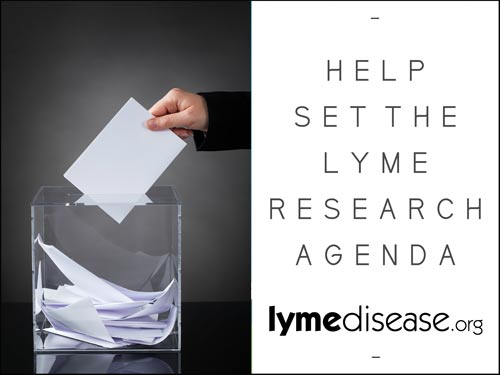LYMEPOLICYWONK: Help Shape Top 10 Priorities for Lyme Research Agenda by Taking Our Survey

Today, LymeDisease.org launches a survey of 25 research questions for the community to vote on and prioritize. The answers will be used to develop a research agenda for the Lyme community which will be publicized and used as a tool to give patients a voice in the funding of research. The ultimate goal is to ensure that research that matters to patients is funded.
Take the Survey
It’s a fact of life that scientists often pursue research questions for their own reasons. Sometimes it’s a pet theory. Other times it may be aligned with a commercial prospect or research that may further their career. Unfortunately, those reasons don’t necessarily line up with the priorities of the people who have the most at stake in the outcome of that research—critically ill patients who are waiting for a cure.
A recent British Medical Journal article by Sally Crowe who works with the James Lind Alliance in the UK explains why patient-driven research agendas should be the foundation of funding grants:
“The …objective of . . . health research is to improve the health outcomes of patients. Our findings show a critical gap between current research and what patients considered to be high priority, and may reflect the lack of patient engagement in research priority setting.”
Our survey is the next step in a process launched in November 2015 at the American Association for the Advancement of Science (AAAS) in Washington D.C. Fifty Lyme disease experts participated in the conference—including 23 patients, 17 researchers, and 10 clinicians. Kristen Honey at the White House orchestrated the convening. LymeDisease.org was given the lead in developing the research question prioritization process and three of its board members spoke at the conference. I was fortunate to participate on a big data panel, with Dr. John Aucott, and D.J. Patel, White House Chief Data Scientist, and announce the launch of our big data project, MyLymeData.
Many physicians from the International Lyme and Associated Diseases Society, including Drs. Ken Liegner, Sam Shor, Chris Green, and Betty Maloney attended. Participating researchers included Drs. John Aucott, Ying Zhang, Nevena Zubcevik, and Cheryl Koopman, Patient community leaders included Phyllis Mervine, Jill Auerbach, Pat Smith, and others.
A series of short presentations sparked debate and dialogue among those attending and ultimately resulted in a preliminary list of research priorities. The decision could have ended there, in the hands of 50 people. However, the goal was to submit the research agenda to the community at large to ensure broad, inclusive participation from the community for those who did not attend the conference.
After last year’s kick-off conference, over 1,000 MyLymeData participants ranked the importance of the preliminary questions and suggested new questions to include on the list. We are now asking for your help in the final step of prioritizing the questions.
This will help us understand which questions are most important to patients, carers, families, researchers, and healthcare professionals for future research.
Please take part if you or a loved one has Lyme disease, or if you are a clinician working with Lyme patients, or a scientist conducting Lyme disease research. Organizations representing the interests of people with Lyme disease may also participate.
Our process is loosely based on that of the James Lind Alliance, which brings clinicians and patients in the UK together to establish research priorities. The James Lind Alliance process typically involves a number of in-person meetings and takes two or more years. We are using technology to amplify the patient’s voice and increase the reach of the survey to include patients who were not involved in the initial meeting.
If you want further inspiration on what’s important for research, we recommend that you take a look at a guest blog by Lyme patient Sherrill Franklin giving her views.
The survey takes roughly 5-10 minutes to complete. Please take the survey so your voice can be counted!
Crowe S, Giles C. Making patient-relevant clinical research a reality. BMJ. 2016;355.
The LYME POLICY WONK blog is written by Lorraine Johnson, JD, MBA, who is the Chief Executive Officer of LymeDisease.org. You can contact her at lbjohnson@lymedisease.org. On Twitter, follow her @lymepolicywonk. If you have not signed up for our patient-centered big data project, MyLymeData, please register now.





















I have tried to take your survey, but the link always quits before the survey is completed. You should make sure this isn’t happening to thousands of us. I have suffered for 35 years and feel my results would be helpful. Too bad you can’t send working surveys out.
I have forwarded your contact info to a member of the MyLymeData team. Someone will be in touch with you.
I had acute viral equine encephalitis in August, 1977. Now, Dr. John Martin (ccid.org) thinks it was Lymes disease.
I am in Tyler Texas. A week after a camping trip to arkansas mountains I found a deer tick on my back . I was already sick and got worse aftere 3 months I went to Er and Demanded Lyme test west blot. It came back pos in very big way. Even with the written test resultis in my hand the Er and Drs in tyler ignore lyme and tell me its all in my head that there is no such thing as lyme or we dont have it here and refuse to treat me. I had to result to treating myself with herbs in hopes something will work. Help stranded in Tyler T exas with no help or hope. Feeling worse every month.
I dont understand why there is such a secret to lyme and it such a hidden covered up problem here in texas, Its like the drs are afraid of Patients with it. I have never seen so many people discrimated agains in tyler Texas